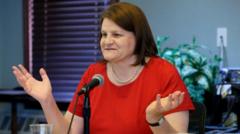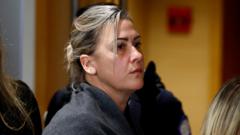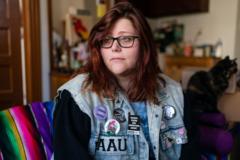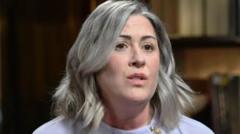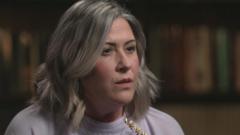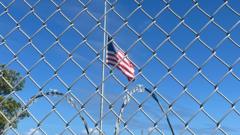**In a heart-wrenching reflection, Caroline Darian voices her pain over unanswered questions and the shortcomings of a major trial that spotlighted her mother's plight.**
**Caroline Darian: Determined to Uncover Her Father's Dark Secrets**

**Caroline Darian: Determined to Uncover Her Father's Dark Secrets**
**The daughter of Gisèle Pelicot seeks justice for her own traumatic experiences as her mother becomes a symbol of resilience in the fight against sexual violence in France.**
In a poignant chapter of her life, Caroline Darian grapples with the overwhelming aftermath of a high-profile trial that saw her father, Dominique Pelicot, and 50 other men convicted for raping her mother, Gisèle Pelicot. The trial, which captivated France and transformed Gisèle into a pioneering feminist icon, was supposed to bring closure. However, for Caroline, it marked the beginning of a personal quest for justice shrouded in despair.
As the courthouse crowd cheered for her mother’s bravery, Caroline felt isolated, consumed by the weight of unresolved trauma. “My own case felt invisible,” she expressed, highlighting the absence of justice for her alleged victimization by her father, whom she believes drugged and assaulted her as well.
The trial meticulously detailed Dominique Pelicot's heinous acts against Gisèle, including drugging her and orchestrating horrific assaults with groups of men. Despite the trial's significance in exposing these atrocities, Caroline's suffering and inquiries about her experience were sidelined. “Dominique wasn’t put on trial for what he did to me,” she recalled during a reflective lunch at a restaurant in Paris.
As a survivor in the shadows of such a historic legal battle, Caroline continues to seek answers and confront the trauma inflicted by her father's actions. She emphasizes, “I left the courtroom feeling more hurt than vindicated.” The duality of a public victory overshadowed by personal anguish highlights the complexity of trauma experienced by survivors in the realm of justice and societal recognition. Caroline’s journey remains a testament to the ongoing struggle for acknowledgment and healing for survivors of sexual violence.
As the courthouse crowd cheered for her mother’s bravery, Caroline felt isolated, consumed by the weight of unresolved trauma. “My own case felt invisible,” she expressed, highlighting the absence of justice for her alleged victimization by her father, whom she believes drugged and assaulted her as well.
The trial meticulously detailed Dominique Pelicot's heinous acts against Gisèle, including drugging her and orchestrating horrific assaults with groups of men. Despite the trial's significance in exposing these atrocities, Caroline's suffering and inquiries about her experience were sidelined. “Dominique wasn’t put on trial for what he did to me,” she recalled during a reflective lunch at a restaurant in Paris.
As a survivor in the shadows of such a historic legal battle, Caroline continues to seek answers and confront the trauma inflicted by her father's actions. She emphasizes, “I left the courtroom feeling more hurt than vindicated.” The duality of a public victory overshadowed by personal anguish highlights the complexity of trauma experienced by survivors in the realm of justice and societal recognition. Caroline’s journey remains a testament to the ongoing struggle for acknowledgment and healing for survivors of sexual violence.





